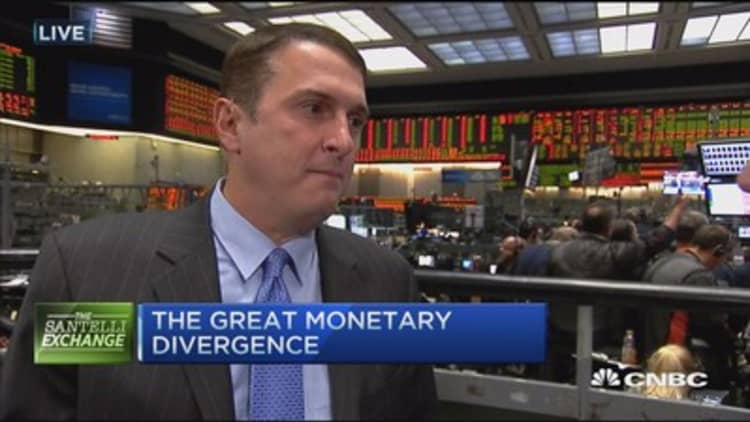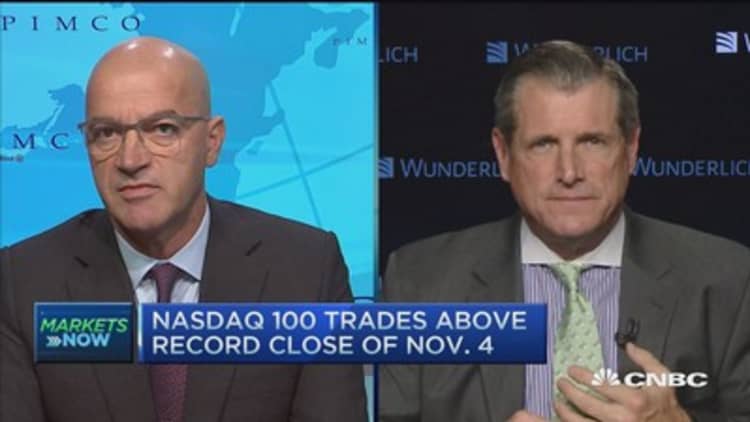
Is "the great monetary divergence" upon us? According to one expert, the answer will become clear in 24 hours.
European Central Bank President Mario Draghi is set to announce new stimulus plans Thursday while Federal Reserve Chair Janet Yellen offered insight into the American economic outlook both Wednesday and Thursday.
"We have more [quantitative easing] coming out of Europe and we'll cut rates here. Rates in Europe and the United States will move in opposite directions for the first time in a long time which is being dubbed as 'the great monetary divergence,'" Jim Bianco, president of Bianco Research, said Wednesday on "Squawk on the Street."
However, Bianco said it's hard to tell what impact the divergence could have on financial markets.
"The effects that will have on money markets, corporate bonds, sovereign debt is still a giant unknown," he said. "Maybe it works out fine, but it's a big experiment."
Sameer Samana, a financial advisor at Wells Fargo, said investors should continue to rely on the U.S. because of the nation's growth trajectories and stability.
"Think about how well the consumer is doing, unemployment is down, low energy prices, think about credit availability is better here than Europe," he said Wednesday on "Power Lunch." "You have U.S. companies outperforming their peers in terms of profitability and you have less … geopolitical risk in the U.S."
David Stubbs of JPMorgan contended, also on "Power Lunch," that while investors can't ignore Europe's geopolitical risks, they are "yesterday's narrative" for equity markets.
Stubbs added that the euro zone will see earnings growth and more fluid credit opportunities than the U.S. due to quantitative easing.
"We like Europe in terms of total return more than the U.S. over the next year," he said. "But let me emphasize this, euro and pound-based investors will still hold a lot of U.S.-based equities because it's the best way to hedge against a further increase in the U.S. dollar."

Bianco said that he believes the U.S. dollar does, in fact, have room to strengthen — a theory Joachim Fels, global economic advisor at Pimco, agreed with.
"I think this has been a theme of ours all year. You see it playing out in the [foreign exchange] markets. We continue to think the dollar can strengthen further," Fels said on "Squawk on the Street." "We have seen a big move already but we think it has further to go, especially against the euro and those Asian currencies."
Fels also said he thinks bank bonds in Europe can do well in an environment where the ECB is still easing as the Fed embarks on what might be "the most dovish rate hike we've ever seen."
"I think clearly the Fed rate hike in December is pretty much a done deal," said Fels. "The markets are priced for an 80 percent probability."
In her speech Wednesday before the Economic Club of Washington, Yellen noted that the job market and inflation are nearing the Fed's desired levels. Yellen also cautioned that additional data could yet sway the Federal Open Market Committee's decision, however, she added that if they wait too long to raise rates, the central bank could inadvertently create a recession.
These comments come as no surprise to Neil Hennessy, portfolio manager and CIO of Hennessy Funds.
"It hasn't changed my view," he told CNBC's "Power Lunch." "Everybody knows interest rates are going to go up. Is it going to be December? January? It's not that big of a deal."
Hennessy said the real problem is that volatility in the marketplace is scaring investors, leaving money sitting in fixed income products.
"When the Fed does raise interest rates, those investors are going to get annihilated and that's not going to be good," he said.
Bob Pavlik, chief market strategist at Boston Private Wealth, said on "Power Lunch" that the best way for investors to approach next year in this market is to look for individual names that are going to be able to ride out the volatility that Europe or the rising dollar may present. Pavlik added that the so-called FANG stocks (Facebook, Amazon, Netflix and Googe), and even Starbucks, are where investors will make their most money.
"Now I know this sort of goes against the rules, but you're going to have to look at these momentum names," he said. "These are not cheap stocks. These stocks have a lot of volatility associated with them, very expensive, but these are what's going to be attracting investors and momentum players."





